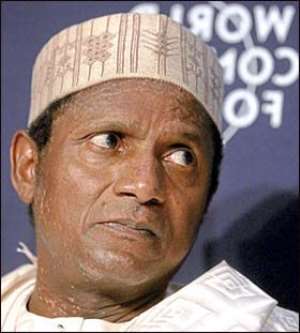
Nigerian President Umaru Yar'Adua has died at his presidential villa following a long illness.
The government announced seven days of national mourning and said the president would be buried on Thursday.
Vice-President Goodluck Jonathan has been sworn in as head of state in a ceremony in the capital Abuja.
Mr Yar'Adua, 58, came to power in 2007 promising many reforms. Analysts say he made the most progress in tackling unrest in the oil-rich Niger Delta.
Nigerian TV interrupted normal programming to announce the news in a brief statement early on Thursday.
The announcer said: "The president and commander-in-chief of the armed forces, Umaru Musa Yar'Adua, died a few hours ago at the presidential villa.
"Security aides notified the national security adviser, General Anou Bissou, who immediately called the acting president. The late president has been ill for some time."
Government spokesman Olusegun Adeniyi said President Yar'Adua died with his wife, Turai, at his side.
Shortly after Mr Yar'Adua's death was announced, people began arriving at the presidential villa in the capital Abuja to pay their condolences.
Mr Yar'Adua will be buried in a Muslim ceremony later on Thursday in his home state of Katsina, in the north of the country.
A spokesman for Mr Jonathan said the acting president had received the news with "shock and sadness".
"Nigeria has lost the jewel on its crown and even the heavens mourn with our nation tonight," Mr Jonathan said in a statement.
He declared Thursday a holiday as part of the seven days of mourning.
Reports said Mr Yar'Adua died between 2100 (2000 GMT) and 2200 (2100 GMT) on Wednesday in Abuja.
Obama tribute
US President Barack Obama led tributes from world leaders.
Mr Obama praised "President Yar'Adua's profound personal decency and integrity, his deep commitment to public service, and his passionate belief in the vast potential and bright future of Nigeria's 150 million people".
In November, Mr Yar'Adua went to a hospital in Jeddah, Saudi Arabia, for several months, during which time he was not heard from, apart from a BBC interview.
He told the BBC by telephone in January that he was recovering and hoped with "tremendous progress" to resume his duties.
A presidential spokesman said at the time that he was being treated for acute pericarditis, an inflammation of the lining around the heart.
His long absence and the lack of detailed information about his health led to a political limbo in Nigeria that was only filled when Mr Jonathan was named acting president.
Mr Yar'Adua returned to Nigeria later in February, but Mr Jonathan remained as acting president.
There had been tension between the two men's supporters and in March Mr Jonathan dissolved the cabinet and later put his own team in place.
According to Nigeria's constitution, Mr Jonathan is to choose a deputy with whom he will serve out the remainder of the presidential term until elections, due next year.
Quiet man
Mr Yar'Adua's election in 2007 marked the first transfer of power from one civilian president to another since Nigeria's independence in 1960.
He came to power promising a long list of reforms, including tackling corruption and reforming the inadequate power sector and the flawed electoral system.
He made progress in banking reforms, but analysts say he made the most progress of his tenure in tackling unrest in the oil-rich Niger Delta, by offering an amnesty to rebels.
The BBC's Caroline Duffield, in Jos, central Nigeria, says President Yar'Adua will be fondly remembered as a quiet and softly-spoken man whose integrity was respected.
But in his last months, it was clear he was too ill to take decisions himself.
His family and closest political advisers had faced severe criticism and were accused of using him to hold on to power, says our correspondent. Source: BBC




 We’ll protect state wealth from opaque deals – Prof Jane Naana
We’ll protect state wealth from opaque deals – Prof Jane Naana
 Mauritania president says running for second term in June polls
Mauritania president says running for second term in June polls
 I won't ever say I was a mere driver’s mate' — Prof. Opoku-Agyemang
I won't ever say I was a mere driver’s mate' — Prof. Opoku-Agyemang
 2024 polls: 'EC struggling to defend credibility'— Prof. Opoku-Agyemang
2024 polls: 'EC struggling to defend credibility'— Prof. Opoku-Agyemang
 Akufo-Addo gov't's 'greed, unbridled arrogance, unrestrained impunity, sheer dis...
Akufo-Addo gov't's 'greed, unbridled arrogance, unrestrained impunity, sheer dis...
 Election 2024: Ghana needs an urgent reset, a leadership that is inspiring – Ma...
Election 2024: Ghana needs an urgent reset, a leadership that is inspiring – Ma...
 Partner NDC to rollout a future of limitless prospects – Prof Jane Naana Opoku-A...
Partner NDC to rollout a future of limitless prospects – Prof Jane Naana Opoku-A...
 NPP will remain in gov’t till Jesus comes — Diana Asamoah
NPP will remain in gov’t till Jesus comes — Diana Asamoah
 Sunyani Technical University demands apology from former SRC president over sex-...
Sunyani Technical University demands apology from former SRC president over sex-...
 'Dumsor' was resolved by Mahama but ‘incompetent' Akufo-Addo has destroyed the g...
'Dumsor' was resolved by Mahama but ‘incompetent' Akufo-Addo has destroyed the g...
